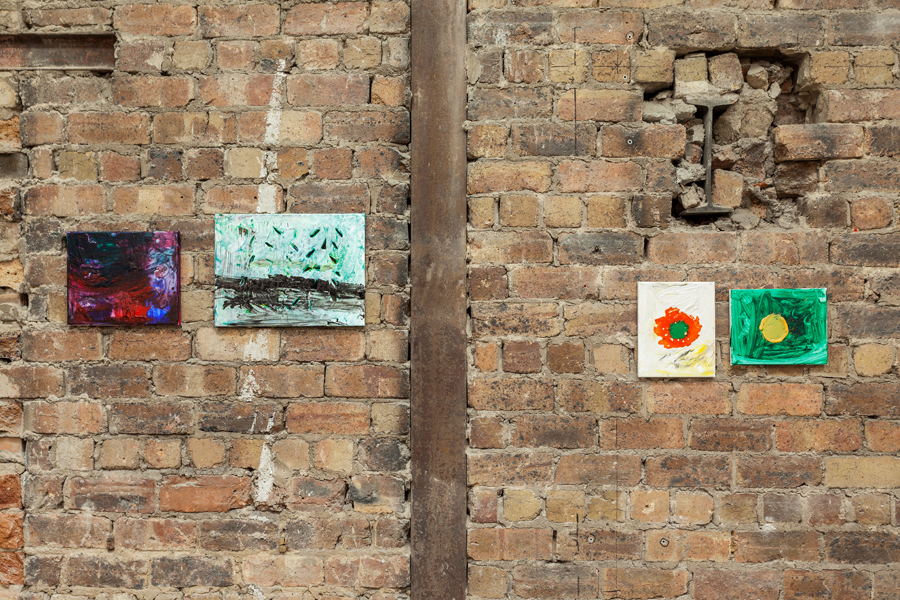Luke Fowler and Sue Tompkins
The Modern Institute, Glasgow, UK
The Modern Institute, Glasgow, UK

In Sue Tompkins’s text-based performances, words bob, weave and reverberate, their sounds and meanings stretched and remade. For Luke Fowler’s film Country Grammar (with Sue Tompkins), (2017), we see and hear Tompkins as she reads the 2003 piece from which the film takes its title but, just as a literal understanding of the words can sometimes slip from our grasp in a flurry of repetition, Fowler’s visual grammar strays from its subject too. While the 18-minute film, transferred to digital from 16mm, includes every word and nuance of Country Grammar, this is no straightforward documentation of the work.
It begins with Tompkins in a recording studio, a pink microphone in one hand, a fixed mic in front of her, as she reads from individual sheets of A4 paper, their corners curled slightly with age. The camera scans the space, flitting and shaking, coming to rest on Tompkins as she rocks and rolls, her gently rhythmic movements suggestive of some kind of word-induced trance. She is filmed from the front, the side, behind, below, her words out of sync with the pictures as she smiles and talks.

We’re told in the accompanying gallery text that ‘Fowler’s main intent was to record Tompkins from a variety of aural and visual perspectives,’ and the use of multiple microphones – they were also installed around the studio – is reflected in the film’s performative presentation. With the screen positioned on the gallery’s back wall, two speakers to the left and right provide a forensic, multi-channel soundtrack that shifts from back to front and side to side. This attention to sonic detail can be seen in the wider installation, too – the concrete floor of the gallery’s Aird’s Lane space has been carpeted and each of the painted orange side walls features an acoustic panel. Spot-lit on the back wall are four of Tompkins’s small abstract paintings (all 2017).
From one of two simple wooden benches, the effect of this considered presentation is a clean, resonant sound – the different channels of sound rise and fall as we hear pages turning, the wind in the trees, a motorcycle passing by. All this while Tompkins’s words keep pulling the viewer in, even as Fowler’s camera cuts away from her performance, his visual roving taking us from close-ups of her restless, almost dancing feet in yellow and pink trainers to the faux countryside of a Glasgow park. It’s this latter footage – a collection of unrelated scenes providing a contemplative echo to Tompkins’s insistent delivery – that makes up the largest part of the film’s imagery. We roam from street to domestic setting, a children’s play area to the inside of a crammed fridge – prosaic sequences with seemingly no direct link to Tompkins’s text.

Since Country Grammar was first performed nearly 15 years ago, our relationship to both words and images has clearly shifted. Listening and watching in 2017 – and also reading each page of the text in the accompanying A5 pamphlet – it’s difficult not to think of social media threads and status updates; Instagram feeds and Snapchat filters. Such developments could, on the one hand, prompt us to ask of the film, ‘Why now?’ Is this, to repeat a term used by Tompkins, simply ‘a reminisce’, an attempt to capture ‘The faded page / Like a dream’ (Tompkins again). Yet, rather than just a reaffirming of memory, Fowler’s treatment foregrounds the urgency and fluidness of the spoken word; crucially, its presentation lends the film a performative, live feel, even though for much of it Tompkins is visually absent. In the battle of words versus time, language has it.
Main image: Luke Fowler, Country Grammar (with Sue Tompkins), 2017, film still, 16mm film transferred to digital. Courtesy: the artist and The Modern Institute/ Toby Webster Ltd, Glasgow, UK; photograph: Patrick Jameson



















